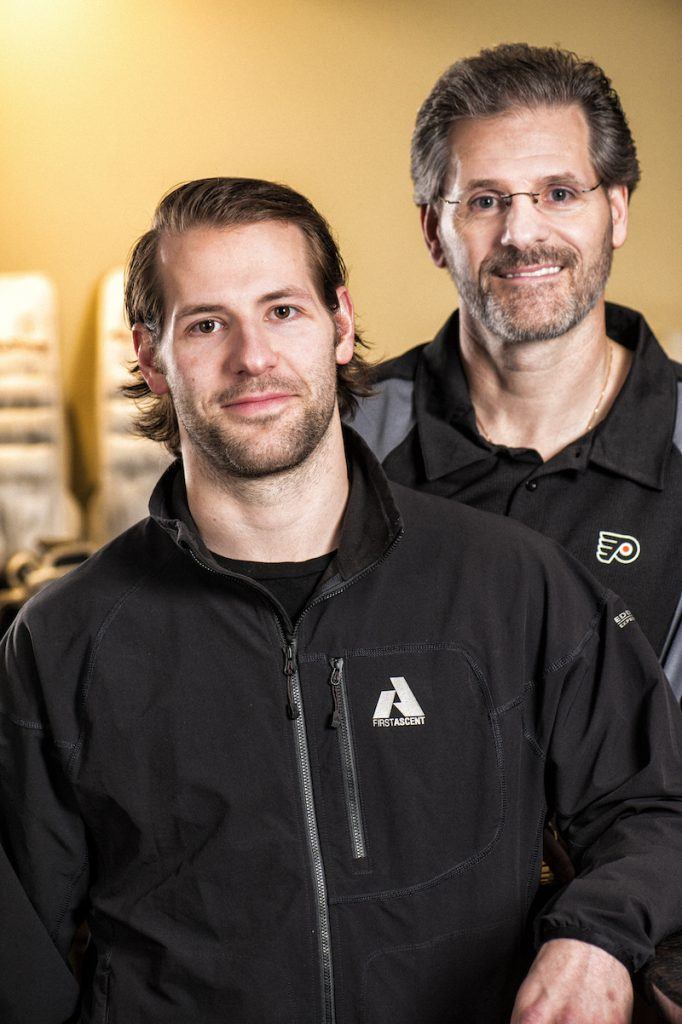 As a kid, Brett Hextall hung out with Flyers greats, like Hall-of-Famers Eric Lindros and John LeClair, not to mention his dad. The Hextalls have three generations of hockey stars: dad Ron, grandfather Bryan Jr., grand-uncle Dennis and great-grandfather Bryan Sr., so for the youngest member of this on-ice dynasty a career in hockey seemed like a no-brainer.
As a kid, Brett Hextall hung out with Flyers greats, like Hall-of-Famers Eric Lindros and John LeClair, not to mention his dad. The Hextalls have three generations of hockey stars: dad Ron, grandfather Bryan Jr., grand-uncle Dennis and great-grandfather Bryan Sr., so for the youngest member of this on-ice dynasty a career in hockey seemed like a no-brainer.
But the other side of being a Hextall brings high expectations and cries of nepotism that shine a bright spotlight on the 27-year-old who grew up in Voorhees. As a winger on the Lehigh Valley Phantoms in the American Hockey League, so far he’s taking the pressure in stride, hoping to prove he has the right stuff to make it to the NHL.
“As a kid it was a dream and as I got older, probably when I was playing juniors at about 18 or 19, I thought I could really take a shot at it, keep working at it and this could really happen,” says Brett.
Ron, 50, isn’t surprised his son chose this path. “Part of hanging around NHL locker rooms when you’re a kid shows you the lifestyle and what the players go through,” he says. “Brett used to hang out with me in the locker room all the time once he got old enough. Whenever he didn’t have school he’d come to practice, so it’s something that you get exposed to, and if you have the real passion, it almost stokes the fire, so to speak. It’s pretty hard to not want it. Brett had enough passion for it when he was very young that if his skills and size allowed for him to play professional hockey, I can’t say I was totally surprised.”
Ron was an NHL goalie from 1986-99, playing 11 of those 13 seasons with the Philadelphia Flyers. Among a multitudeof awards and honors, Ron was the first goalie to ever score a goal in a game by shooting the puck into the opposing team’s empty net. He did it twice.
“I’m not sure it’s been either an advantage or disadvantage,” Ron says of the Hextall name. “It’s something that gets talked about, but there were never any expectations put on Brett from myself or my wife or anyone else in our family. He’s Brett – not Ron or his grandfather or great-grandfather.”
Brett insists he never felt stifled by his father’s shadow, always feeling fortunate to have grown up in the Flyers’ locker room. “If people looked at me like maybe I had a better chance because of my name – I don’t think it ever helped me the way people assume it did,” says Brett. “My dad’s a quiet guy, not the type who would be out there telling everyone how great he is or how great I am.”
Those who might have questioned his ability only motivated Brett to work harder. That motivation fueled him to succeed when he was younger, as he worked his way through college and junior hockey. “Once you reach a goal, especially as an athlete, it’s on to the next,” he says. You turn the page and look to the next challenge. There’s always a next challenge.”
For Brett, the next page is playing in the NHL. Attaining that goal will be a combination of skill and luck. Last season he played 63 games, scored six goals, had eight assists and 14 points with the Phantoms. His personal highlights include a playoff berth two years ago when he played for the Portland Pirates and making it to the Frozen Four while at the University of North Dakota. But he knows that luck is equally important – an NHL team must have a need for his skills.
“I can only control the way I play and how hard I work, so that’s the challenge, to just be the best player I can at that level. Hopefully somebody takes notice, and I can get NHL games,” he says.
Many have compared Brett’s penchant for on-ice fights to his father’s style of aggressive play.
“That’s an interesting topic in today’s game,” says Brett. “Everyone likes seeing fighting, because it’s the emotion that finally boils over. You have to temper yourself in hockey, which is a great thing, but fans get to see that raw emotion and players get to use it in a way that’s somewhat controlled. The ref’s there, and there’s a respect among players. But it’s for protecting your teammates and making sure nobody’s taking liberties with your guys. It keeps control of the game, really.”
Off the ice, Brett has the full support of his family, including Mamie, his wife of two years. She’s a medical resident at the University of Iowa. The pair met through mutual friends when Brett was entering his sophomore year at the University of North Dakota, and she was starting medical school there.
With Mamie still in her residency in Iowa and Brett in Lehigh Valley, the newlyweds are maintaining a long-distance relationship. “This was an especially tough year,” he admits. “I think we got 14 days together since September. It’s definitely a challenge for us. Not many relationships can do that, and I feel pretty fortunate to have her support.
“To have her to share all the success with and share hard times with, it helps having her by my side to bounce things off of. Her support has been huge, and despite the distance, she’s been there 100 percent whenever I need her. And I support her – we definitely make it work. She realizes I can only play hockey for so long, and she wants me to make the most of it, which is great.”
Though the pair text throughout the day and use FaceTime as much as possible, they live day-to-day for now, given the uncertain nature of Brett’s one-year contract. “You just have to embrace unpredictability,” he says.
Ron has been married for 30 years to Diane, his high-school sweetheart. “When we met, she was 16 and I was 17. I was playing junior hockey, and she was a figure skater,” he says.
Brett and his dad are close, but Brett says Ron never gave him unsolicited advice about the game.
“He’s one of those people that believes in learning on your own,” says Brett.
“He’s definitely willing and available if I have questions, but he’s not going to start throwing ideas at me out of nowhere. It’s an interesting perspective, me as a player and him as a general manager. We look at things differently, which sometimes makes for some interesting conversations. We’ve always been able to, if not agree, at least respect the other’s point of view.”
“I’ve always been one to let the coach coach, I don’t like to interfere with that,” says Ron. “We talk hockey – it’s both of our lives.”
Ron does recall one teaching moment when Brett was young. “There was one time when I didn’t feel that he worked hard,” Ron says. “I think that was the only time in our lives that I ever got on him about work ethic. As long as my kids went out and worked hard and did the best they could do, I was fine with it. I wasn’t a meddling parent or the parent who put pressure on them to be a professional hockey player.”
“My father never put any pressure on me to be a hockey player,” Ron adds. “If I wanted to, that was fine, but if I didn’t want to, that was also fine. I had a passion for the game at a very young age just like Brett.”
Once his playing days came to an end in 1999, Ron joined the Flyers front office, first as a professional scout, then as director of professional player personnel. But in 2006, he left the Flyers, taking on the role of vice president and assistant general manager for the LA Kings.
“When I moved to LA it was probably the hardest decision I ever made, leaving this organization,” he says. “I was 42 years old, not an old man by any stretch, but I was at the point that I had to move up if I wanted to be a general manager.
With Clarkie [Bobby Clarke, then Flyers GM] being locked in and Homer [Paul Holmgren] being behind him, I didn’t see a lot of hope there in the near future. So I ended up making a move.”
With the Kings, Ron finally won the Stanley Cup that had eluded him in Philly. A year later, in 2013, he returned to the Flyers as assistant general manager, hoping to bring that winning formula back home. It’s been 40 years since the Flyers won a cup, and fans have not been shy about sharing their frustration. Last year Ron was promoted to Flyer’s GM, but neither Hextall’s team made it to the playoffs, a sore subject for both.
“You’re never thinking about the pressure,” says Ron. “For me, it’s just: ‘Let’s do everything we can to build a team here to make a long run at the cup.’ I’d like to think that after all these years I know what I’m doing. If you start feeling pressure or listening to people, you’re not going to make the right moves. I’ve got a job to do, work hard and be focused and stay in it for the long haul.
Sometimes it’s easy to try to be successful short-term, but in the end it takes time to build, and that’s what we’re in the process of doing here.”
Ron says getting off to a losing start last season put them in a hole that was too difficult to overcome. “I’d certainly try to remedy that going into this year,” he says.
In exit interviews with his players at the end of last season, Ron felt their disappointment, and he has faith they’ll step up next season. “There’s a real fine line between winning and losing and executing more consistently and having better puck support – a lot of little things that we need to do together as a team to improve. If we do the little things, we’ll be in the playoffs rather than out of the playoffs.”
Brett tries to ignore outside criticism of his dad. “When he got the general manager’s job the family was really excited, but I don’t think my little brother and sister [Jeffrey, 19 and Rebecca, 23] remembered him playing,” says Brett. My older sister and I remembered the criticism then. I told them, ‘I know you’re happy and things are great right now, but just wait. After a year or two there’s going to be a lot of criticism, and it’s going to be hard for you to hear. You just need to let it go in one ear and out the other and slide off your shoulders.’ I think being younger and seeing criticism from when he played prepared me for the criticism that he will get now.”
The silver lining of the Phantoms not making the playoffs was Brett’s ability to fly home to Mamie sooner. He’ll spend the off-season training in Iowa. When his playing days do come to an end, ultimately he’d like to open a gym. But first he’s hoping there’s an interim stop in the NHL. Dad would be thrilled.
“It’s been Brett’s lifelong dream, probably like every other kid in the organization,” Ron says. “I’d be a happy father.”













